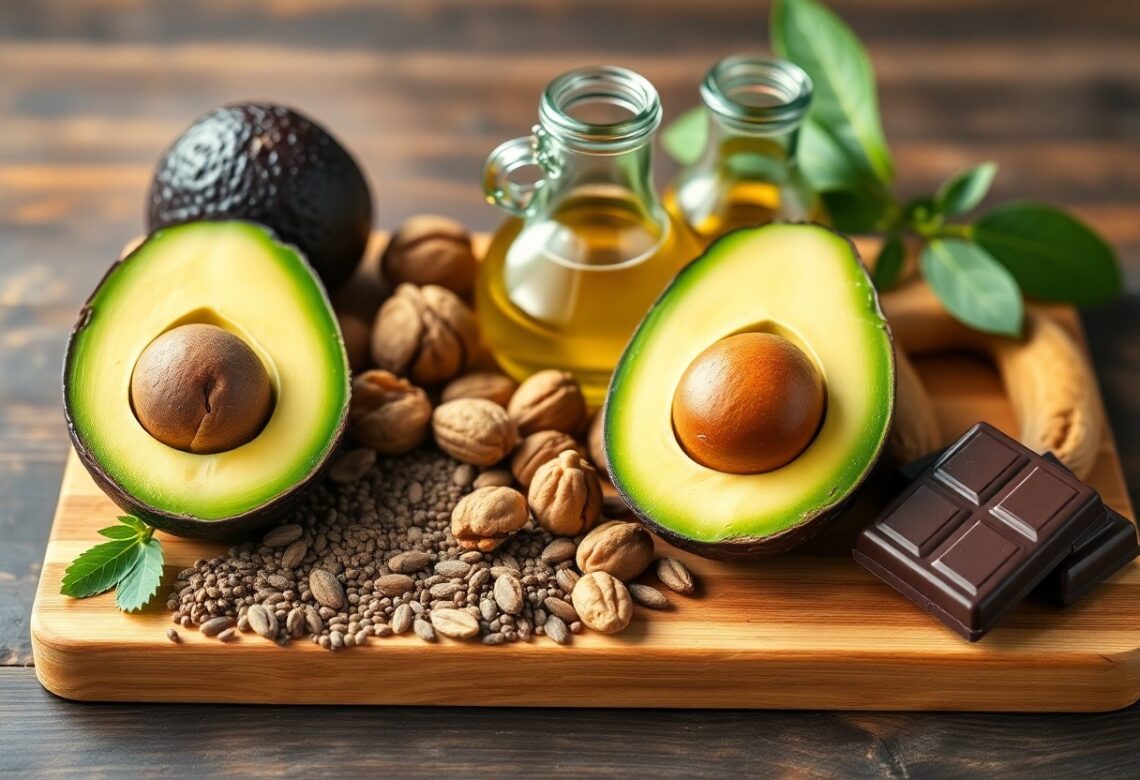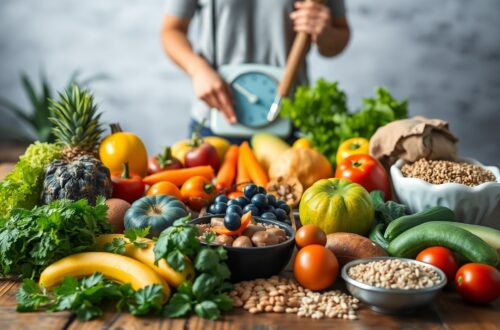Weight loss doesn’t mean you have to shy away from fats; in fact, including healthy fats in your diet can support your weight loss journey. This comprehensive guide will help you identify the various types of healthy fats that promote not only weight loss but also overall well-being. From avocados to nuts and olive oil, you’ll discover which fats to incorporate into your meals for better health and sustainable results. Let’s explore the complete list of healthy fats and how they can fit into your diet effectively.
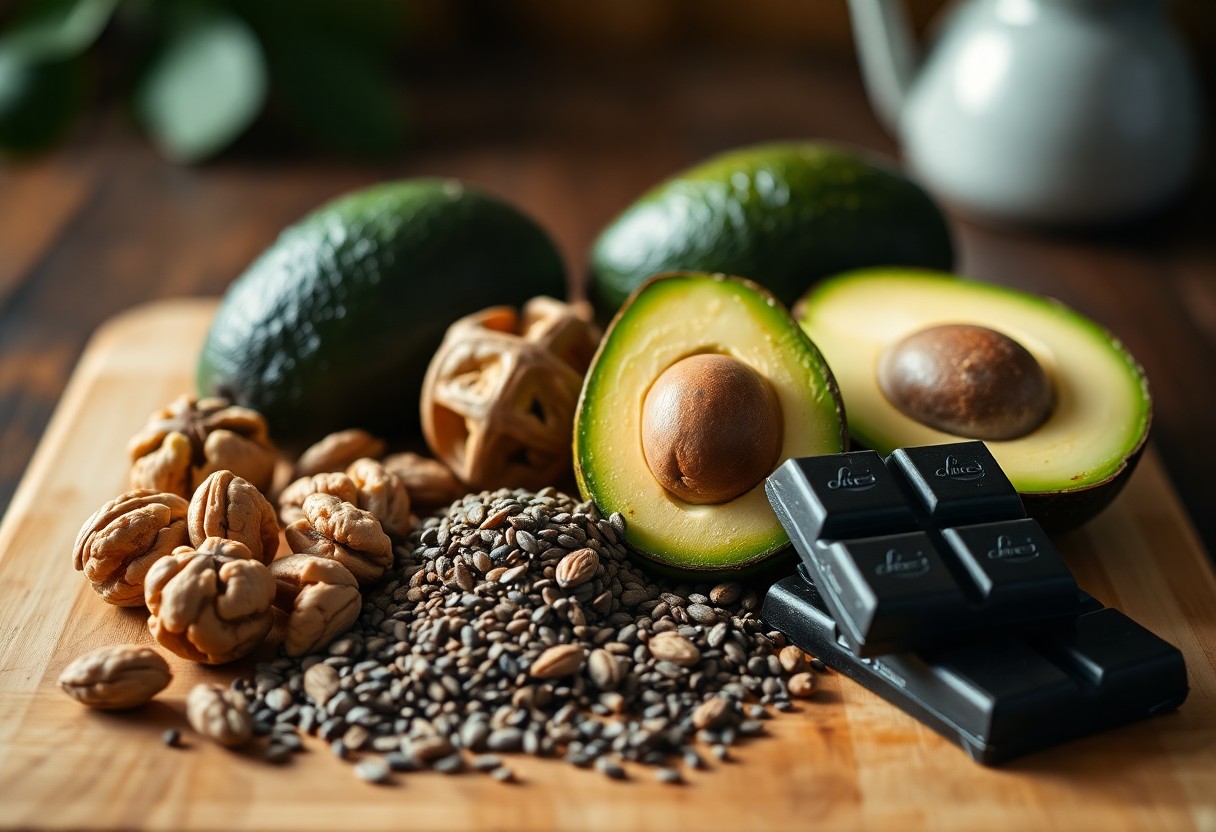
Key Takeaways:
- Avocado: Packed with monounsaturated fats, avocados can enhance satiety and promote healthy skin.
- Nuts: Almonds, walnuts, and pistachios are excellent sources of omega-3 fatty acids and support heart health.
- Olive Oil: Rich in oleic acid, olive oil is a staple in the Mediterranean diet and is linked to weight loss benefits.
- Fatty Fish: Salmon, mackerel, and sardines provide high-quality protein and are loaded with omega-3s, which can help reduce inflammation.
- Seeds: Chia seeds, flaxseeds, and pumpkin seeds are great sources of fiber and healthy fats, aiding digestion and fullness.
- Coconut Oil: Contains medium-chain triglycerides (MCTs) that may boost metabolism and assist in weight management.
- Dark Chocolate: In moderation, dark chocolate provides antioxidants and healthy fats, supporting heart health and satisfying sweet cravings.
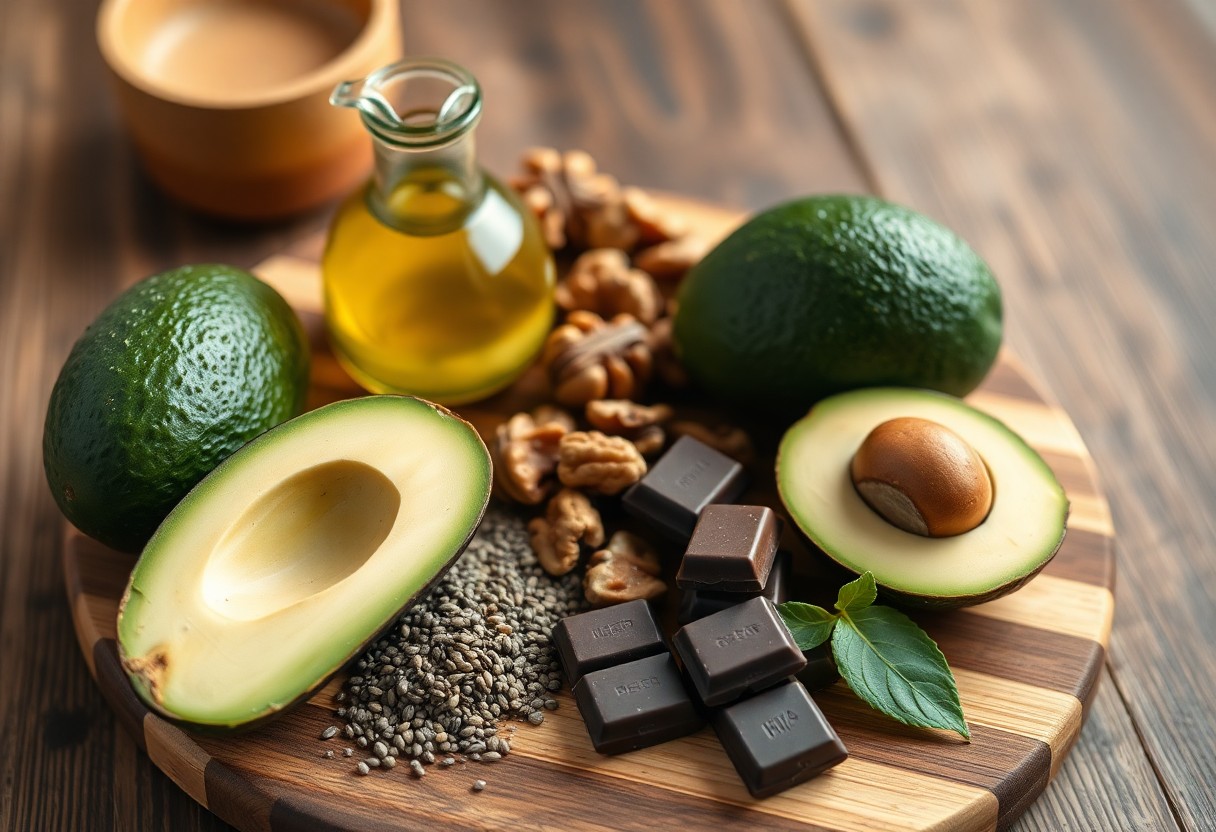
Understanding Healthy Fats
To maintain a balanced diet, it’s important to understand what healthy fats are and how they can benefit your overall health. These fats not only provide energy but also support cell growth, protect your organs, and help your body absorb important vitamins. Unlike unhealthy fats, which can lead to various health issues, healthy fats are vital for your body’s optimal functioning and can play a role in your weight loss journey.
Types of Healthy Fats
To navigate healthy fats effectively, it is helpful to distinguish between different types you can incorporate into your diet:
- Monounsaturated fats (e.g., olive oil, avocados)
- Polyunsaturated fats (e.g., fatty fish, walnuts)
- Omega-3 fatty acids (e.g., salmon, flaxseeds)
- Omega-6 fatty acids (e.g., sunflower oil, hemp seeds)
- Saturated fats in moderation (e.g., coconut oil, dark chocolate)
After learning about these options, you can make informed choices to support your health and weight loss goals.
| Type of Healthy Fat | Examples |
| Monounsaturated fats | Olive oil, avocados |
| Polyunsaturated fats | Fatty fish, walnuts |
| Omega-3 fatty acids | Salmon, flaxseeds |
| Omega-6 fatty acids | Sunflower oil, hemp seeds |
| Saturated fats in moderation | Coconut oil, dark chocolate |
The Role of Healthy Fats in Weight Loss
An effective weight loss plan doesn’t require you to eliminate fats entirely; instead, you should focus on incorporating healthy fats into your meals. These fats can enhance satiety, meaning you feel fuller for longer, which reduces the likelihood of overeating. They also help regulate hormones that are vital for managing your appetite, making it easier to stick to your weight loss goals.
With the inclusion of healthy fats in your diet, you can benefit from improved metabolic rates and better overall nutrient absorption. These fats provide important fatty acids that can disrupt cravings and help you maintain energy levels, especially during weight loss efforts. Therefore, by thoughtfully integrating healthy fats into your meals, you can create a satisfying diet that promotes weight loss while still delivering the nutrients your body needs.
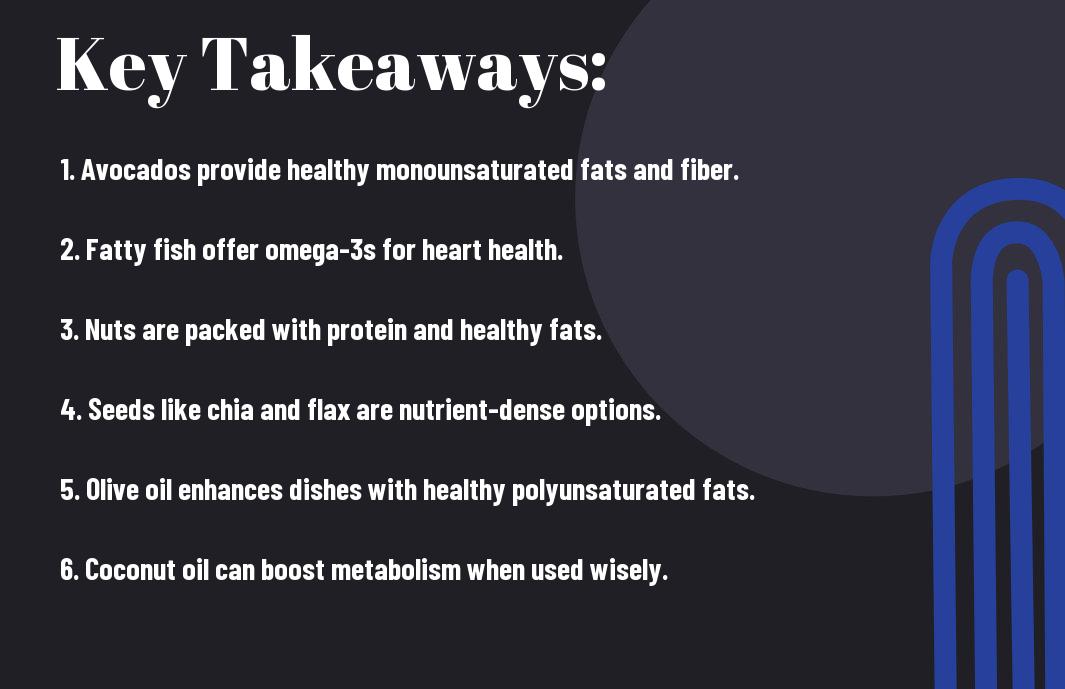
Essential Sources of Healthy Fats
Assuming you are seeking to incorporate healthy fats into your diet, it’s imperative to understand where to source them effectively. Certain foods pack a variety of beneficial fats that support weight loss and overall health. Prioritizing foods rich in omega-3 and monounsaturated fats can help you achieve your weight management goals while also enhancing your body’s functionality. By focusing on these healthy fat sources, you can elevate your meals and nourish yourself adequately.
Avocados
At the center of healthy fat sources is the avocado, a nutrient-dense fruit loaded with monounsaturated fats. These fats not only provide a creamy texture to your dishes but also promote heart health and help to keep you feeling satiated. Including avocados in your meals can be as simple as slicing them for a salad or blending them into a smoothie. Their versatility makes them a must-have for your healthy eating plan.
Nuts and Seeds
Before submerging into the world of nuts and seeds, consider their incredibly diverse nutritional profiles. These tasty snacks are packed with healthy fats, protein, and fiber, making them perfect for weight management. Various options, like almonds, walnuts, chia seeds, and flaxseeds, provide your body with imperative fatty acids that support brain and heart health, while also keeping your hunger at bay.
Indeed, adding a variety of nuts and seeds to your diet can enhance your meals while contributing significant health benefits. They are excellent sources of omega-3 and omega-6 fatty acids, which play vital roles in maintaining your body’s functions. For snacking, choose a handful of nuts or sprinkle seeds on your yogurt or salads. Their satisfying crunch allows for endless culinary creativity while supporting your weight loss journey effectively.
Healthy Oils for Cooking
Your choice of cooking oils can significantly influence your health and weight loss journey. Opting for nutrient-rich oils can enhance your meals without packing on extra calories. For insights into which oils are the healthiest options, check out The Best Healthy Fats for Weight Loss, Recommended by ….
Olive Oil
For flavorful and heart-healthy cooking, olive oil is an excellent choice. Rich in monounsaturated fats and antioxidants, this oil supports cardiovascular health and can aid in weight management by keeping you satisfied longer.
Coconut Oil
Any kitchen can benefit from the versatility of coconut oil. Its unique medium-chain triglycerides (MCTs) are easily metabolized for energy, making coconut oil a fantastic option for those looking to maintain or lose weight. Plus, its rich flavor adds a delightful twist to various dishes.
It’s worth noting that coconut oil can withstand higher cooking temperatures, making it ideal for sautéing and baking. By incorporating this oil into your meals, you can enjoy its numerous benefits while enhancing the taste of your favorite recipes. Use it in moderation to balance your diet effectively.
Fatty Fish and Seafood
Not all fats are created equal, and incorporating fatty fish and seafood into your diet is a smart choice for weight loss. These options are rich in omega-3 fatty acids, which can improve heart health and reduce inflammation. Additionally, they are a great source of high-quality protein that can help keep you feeling full and satisfied, making it easier to manage your weight.
Salmon
Below the surface, salmon is a powerhouse when it comes to healthy fats. It’s particularly high in omega-3 fatty acids, which support brain function and contribute to cardiovascular health. Not only does it promote fat loss, but its rich flavor also makes it a versatile choice for various meals, from grilled to baked dishes.
Sardines
After exploring salmon, sardines also present an excellent choice for incorporating healthy fats into your diet. They are packed with omega-3 fats and provide a wealth of nutrients in a convenient, easy-to-eat form.
With their small size and high nutrient density, sardines deliver impressive amounts of omega-3 fatty acids and Vitamin D, making them an exceptional addition to your meals. They’re not just nutritious but also budget-friendly and can be enjoyed straight out of the can or added to salads and pasta for extra flavor and richness. Embracing sardines can help you feel fuller longer and support your weight loss journey by promoting a balanced diet.
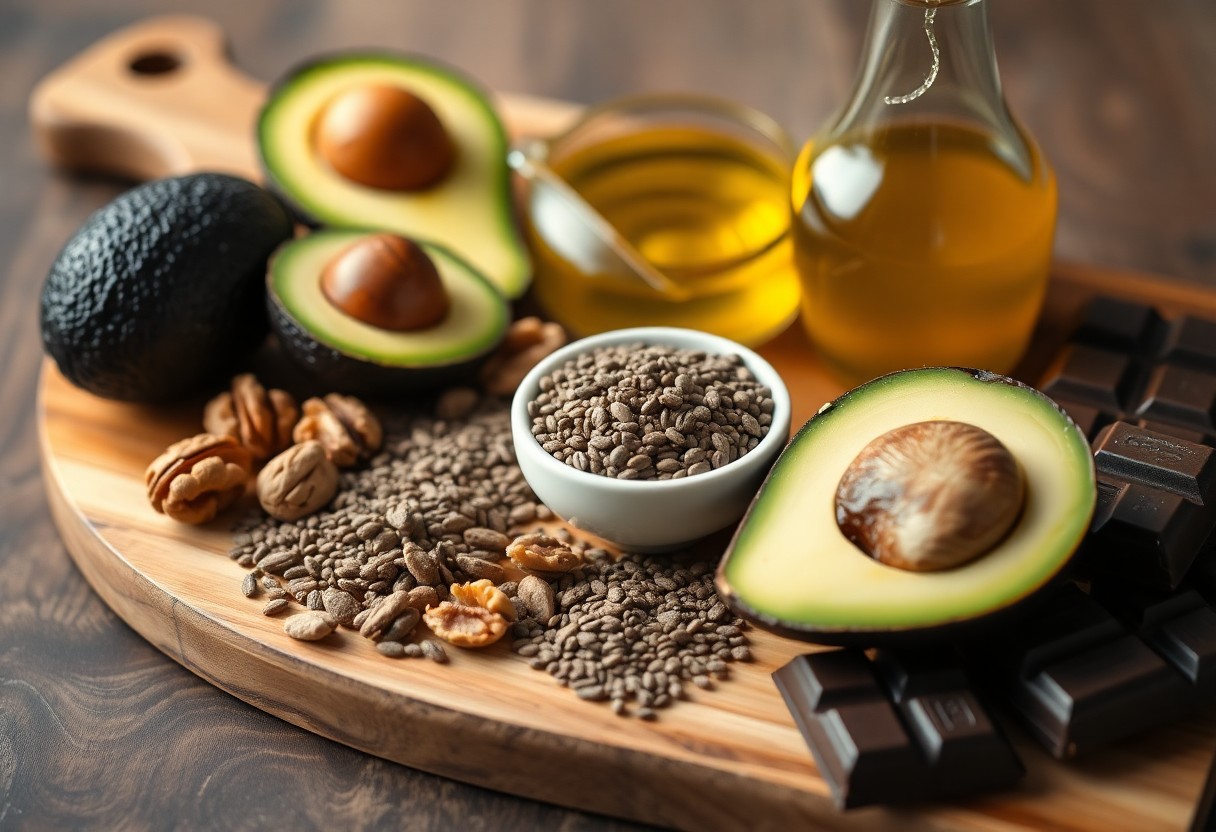
Dairy Products with Healthy Fats
Once again, incorporating dairy products with healthy fats into your diet can provide necessary nutrients while supporting your weight loss goals. These foods not only offer a delightful flavor but also supply beneficial fats that can keep you satiated and energized throughout the day. When choosing dairy, opt for full-fat versions, as they often contain higher levels of healthy fats that aid in nutrient absorption and promote a healthier metabolism.
Greek Yogurt
One excellent choice is Greek yogurt, which is not only rich in protein but also packed with healthy fats. The creamy texture and tangy taste make it a versatile ingredient for smoothies, dressings, or as a snack. By selecting full-fat Greek yogurt, you enhance your health benefits while enjoying a delicious treat.
Cheese
For those who love cheese, it’s important to choose varieties that offer healthy fats. Cheeses like feta, goat cheese, and cheddar can provide flavor and creaminess to your meals without derailing your weight loss efforts.
Indeed, cheese can be part of a balanced diet if consumed mindfully. The healthy fats present in cheese help regulate hormones that control hunger, allowing you to feel fuller for longer. Plus, cheese is a great source of calcium and protein, making it a valuable addition to salads, sandwiches, or even as a standalone snack. By enjoying cheese in moderation, you can savor its richness while staying on track with your weight loss goals.
Incorporating Healthy Fats into Your Diet
Now is the perfect time to integrate healthy fats into your meals for improved weight loss and overall health. You can start by exploring Healthy fats: 12 high fat foods to eat to find nutritious options that suit your preferences. Include these fats in your cooking, or pair them with your favorite dishes to enhance flavor and benefits.
Meal Planning Tips
For effective meal planning, focus on incorporating healthy fats into your weekly menu. Here are a few helpful strategies:
- Choose avocados or olive oil as your go-to fats.
- Include nuts and seeds in your snack rotations.
- Opt for fatty fish like salmon twice a week.
- Replace butter with coconut oil in baking.
Thou can create balanced meals that promote satiety and support weight loss.
Healthy Snack Ideas
Healthy fats can elevate your snacking game, offering delicious and satisfying options. Instead of reaching for sugary snacks, consider incorporating avocados, nut butters, or trail mix with almonds and walnuts to keep your energy levels stable throughout the day.
Understanding your snacking habits can help you make healthier choices. Look for snacks that include a mix of healthy fats, such as apple slices with almond butter or Greek yogurt topped with chia seeds. This will not only satisfy your cravings but also provide lasting energy and crucial nutrients.
Final Words
On the whole, incorporating healthy fats into your diet can significantly support your weight loss journey while promoting overall well-being. By choosing sources like avocados, nuts, seeds, and olive oil, you not only enhance the flavor of your meals but also improve nutrient absorption and satiety. As you refocus your dietary habits, consider these healthy fats as integral components that can keep you feeling full and satisfied, ultimately leading to better weight management and health outcomes. Make informed choices, and let healthy fats empower your lifestyle.
FAQ
Q: What are healthy fats?
A: Healthy fats are types of fats that provide necessary fatty acids and promote health. They include monounsaturated and polyunsaturated fats, which can be found in foods like avocados, nuts, seeds, and fatty fish. Incorporating these fats into your diet can enhance satiety and provide necessary nutrients.
Q: How can healthy fats aid in weight loss?
A: Healthy fats can aid in weight loss by promoting satiety, helping you feel fuller for longer periods. This can lead to reduced overall calorie intake. Additionally, they stabilize blood sugar levels, which may help decrease cravings and support long-term weight maintenance.
Q: What are some examples of healthy fats I can add to my diet?
A: Some examples of healthy fats include olive oil, avocados, fatty fish (like salmon and mackerel), nuts (such as almonds and walnuts), seeds (like chia and flaxseeds), and coconut oil. These foods not only provide healthy fats but also offer additional nutritional benefits.
Q: How much healthy fat should I include in my diet for weight loss?
A: It is recommended that healthy fats comprise about 20-35% of your total daily caloric intake. However, individual needs may vary based on factors like activity level and metabolic health. It’s best to focus on portion sizes and choose nutrient-dense sources to meet your dietary requirements without overdoing it.
Q: Are there any unhealthy fats that I should avoid?
A: Yes, you should limit or avoid trans fats and excessive saturated fats, often found in fried foods, baked goods, and processed snacks. These unhealthy fats can lead to weight gain and increased risk of heart disease. Opt for healthier alternatives instead.
Q: Can I include healthy fats in every meal?
A: Including healthy fats in every meal can be beneficial, as they enhance flavor and improve nutrient absorption. You can add avocado to salads, sprinkle nuts on yogurt, or use olive oil as a dressing. Balance is key, so ensure you’re also including a variety of other nutrients.
Q: How do I know if I’m consuming too many fats?
A: Monitoring portion sizes and being aware of your overall caloric intake can help you know if you’re consuming too many fats. If you find that your weight is not changing despite a balanced diet, consider reviewing the amounts of fats you are including, and consult a nutritionist if needed.
